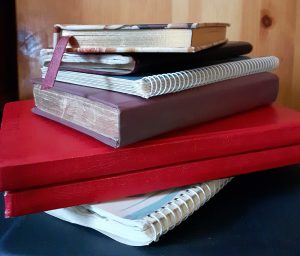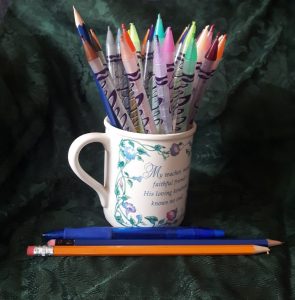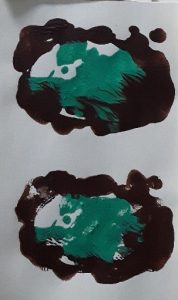4 Keeping a Journal, “It Matters”
Chapter 1
This section discusses journaling and how it can be used as a tool to support your goal of self-care.
Keeping a Journal, “It Matters”
A journal is a private and intimate place for you to write, draw and create. Your journal can also be used as a tool to help you connect and explore your thoughts, feelings and behaviours with a focus on self-care. There are several reasons why people start journalling. Some decide to start journalling on their own, others start journalling at the request of a member of an eating disorder team and some journaling may not prefer journalling at all.
Nevertheless, if you choose, you may write in order to express how you think, feel, and behave. You can record and express your wonders, dreams, hopes, and whatever else comes to mind. Whether you share the contents of your journal is your choice. Because you may choose to write about your life, physical or mental health, family, friends, work, schooling, and community life, your journaling may be sensitive, private and at times, something you may not be willing to share. Whether your decision to share your journalling stays the same or varies over time, know that whatever decision you make is okay.
Creative Space: Questions to Consider
Below is a list of questions for you to consider as you begin and/or continue along your self-care journey. You don’t have to answer all of them. However, if you are using the online version of this resource, you can return at any time and provide additional details and/or reflect on your growth and ongoing challenges.
- Do you have any previous experience with journaling? If so, what type(s)?
- What do you include in your journals (e.g. drawings, doodles, poetry, art, music, etc)?
- Have you shared your journal with a trusted person?
- How did you decide on whether or not to share your journal?
- Did you find that sharing was helpful? If so, how?
What we know from our collective experience is that journaling or keeping a diary has been and continues to be an important part of healing and ongoing self-care. Additionally, from research , we understand that journaling, accompanied by discussions with trusted individuals, can be especially helpful (Alexander, 2015; Fursland et al., 2010).
Journals Come in All Shapes and Sizes
Journals are available in many shapes and sizes. They may be sheets of paper that you organize, a lined or plain paged book, an online resource, or an app. Some journal formats ask specific questions or provide prompts to help you recall and write your thoughts. Some journals may be blank, where you fill in the pages with notes, images, doodling, and sketches.

Creative Space
- Draw or upload a picture of your journal. Is it a private space for your eyes only?
- Do you have more than one journal? If so, how do they vary and how are they similar?
- Do you write different information and create differently in your private journal versus the journal you were asked to complete by a professional? What are the differences between them and can you describe them?
Sharing
We know from our experiences with eating disorders, therapy, and related literature that there are often benefits to sharing your journal with a trusted person or health care provider (Craske, 2014; Keel, 2017). However, it may be difficult to trust and confide in others. You may have spent time avoiding sharing your emotions (thoughts and feelings) and your relationship with food. The process of writing, doodling, creating and sharing may provide insights into your thought processes and relieve some of the struggles underlying your disorder(s). In time, and as you journal, you may begin to connect your emotions to your behaviors.
Creative Space
- Create a journal entry that explores what trust means to you?
- Can you identify some sentences that you would be willing to share with a trusted individual?
- Can you make a list of people you would trust with your journal? Does this list change over time?
Journals Have Many Purposes
As a group, when we look back at our collections of eating disorder journals, we realize they have served many purposes. It has been our experience that the more we allow ourselves to create with words and images, the more meaningful and helpful conversations become with family, friends, peers and healthcare providers.
Examples of work we have created, thought about, or responded to, in our journaling process.

How can these pencils and crayons contribute to your journaling?

How can fabric facilitate creativity as you explore your thoughts and feelings?

How do you use technology (e.g., photography) to promote your health?
You may begin to journal when an eating disorder therapist asks you to record your day-to-day life (Harvey, 2011). In this case, the therapist may ask you to write about specific events, feelings, or about your eating patterns. For example, a registered dietitian may ask you to complete food diaries and records focused on types of food you eat, portion size, physical activity or over-activity, or water and caffeine intake (Dietitians of Canada, 2012; Heruc et al., 2020; Jeffery & Heruc, 2020).
In contrast, there are journals that you may create that you don’t share with others, and that is okay. These journals may record your feelings, events, and responses to life, including food and fluid intake. Remember, the act and time it takes to create your journal is a step on your journey to health. In addition, Pennebaker and Smyth (2016) in their book, Opening Up by Writing it Down, argue that “by talking or writing about a secret experience, we are translating the event into language. Once it is language based, we can better understand…” (p. 11). Moving words, thoughts, feelings, and memories to the journal page, breathes life into the experience and can honour the impact events have had on your mental health.
Creative Space
- Do you have journals that you completed at the request of others?
- What types of journals are these?
- Do you have journals that you never shared?
- Would you like to find a trusted person to discuss the contents of these journals?
- Can you describe, draw, or create what trust means to you?
https://sketch.io/sketchpad/
- Create an image of what you might feel if you shared journal entries with a trusted person. https://sketch.io/sketchpad/
|
|
Reflect and describe how you felt throughout this activity?
Learning from Journaling
From journaling and sharing her journal with a trusted professional, Janet learned she lived within a competing narrative. In one story, she was a competent, respected and professional. In her other story, she was struggling to be the thinnest. At times she worried she would not be able to keep the stories separate and her secrets would become known. Through journaling, sharing, and plenty of hard work and prayer, she came to understand her eating disorder in relation to traumatic events. As a result, she began to experience increased safety and comfort in her own skin while learning to thread the stories together into a healthy whole.
To help understand the competing stories, Janet created a picture of two-worlds. This image was created using acrylic paint dripped onto the fold of a recycled paper, then folded in half and squished with my fingertips .


Hannah also shared the importance of journaling in coming to understand oneself:
“I didn’t connect my past to my eating disorder. The emotions that trauma generated caused such unease, that it was ‘easier’ to starve myself, binge and purge and rely solely on the bathroom scale as a measurement of my self-worth than it was to manage the emotional pain. I found it painful to share my agony with others, but the words flowed onto paper. I could connect my thoughts and feelings to my behavior and while it didn’t cure my eating disorder, it started the lifelong process of healing”- Hannah
“I am not a writer, a doodler, or an artist. I write or better yet, type, my words. I allow my thoughts to flow onto my laptop. I have created my own word document that acts as my journal. It documents the past and the present. I am able to edit my thoughts and feelings to clarify my intentions.Writing does not come naturally to me, it takes time and patience for me to write, but once I begin, I can complete my thoughts. Writing for me, is liberating. The pages give life to my story and my pain” – Hannah.
Creative Space
- Does the thought of journaling sound liberating or does it generate fear? If so why?
- What is a story you have told yourself about who you are?
- Does considering the role of journaling in your eating disorder bring you any encouragement and hope?


